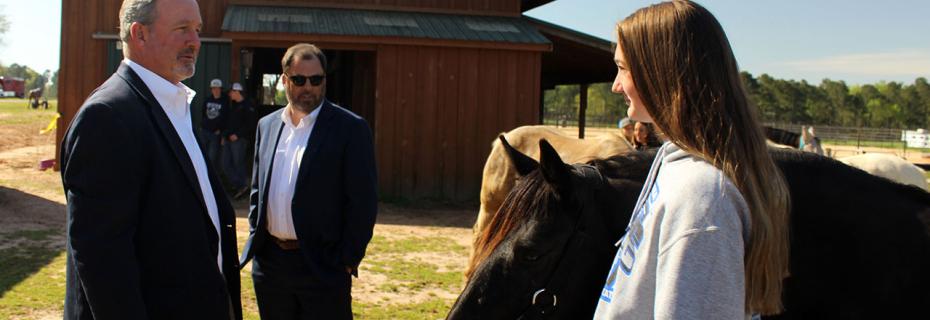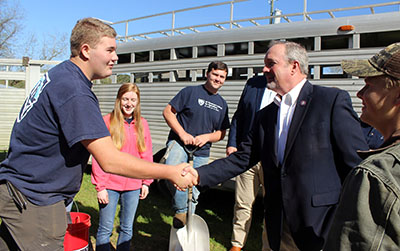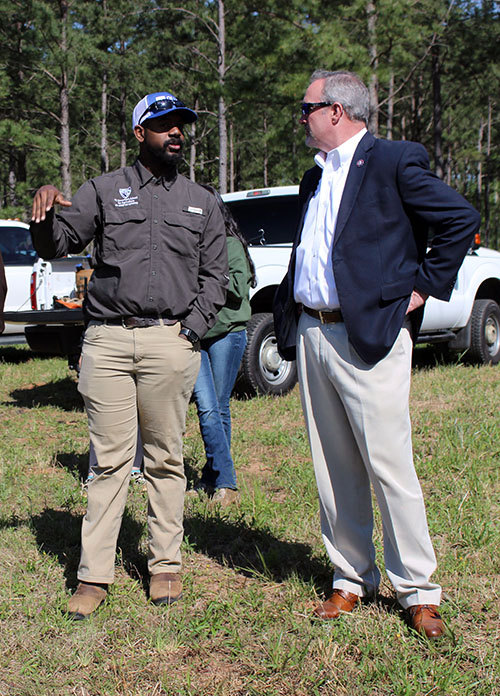About Us
Learn More
 The Official Web Site of the State of South Carolina
The Official Web Site of the State of South Carolina

Congressman Jeff Duncan gently scratched the nose of a horse led across the open-air arena by Caitlyn Krout of Fair Play and listened as the student explained the finer points of competing in horse shows and caring for her trusty steed.
The depth of knowledge and confidence exhibited by the young equestrian impressed Duncan, who is himself a veteran horseman.
“To talk with these kids, they have their horses, and they’re involved in different activities, learning how to take care of the animal, becoming a partner with that animal and then going out and competing and winning,” he said. “I’m glad the Governor’s School has this type of program.”
 The newly-constructed equine center at the South Carolina Governor’s School for Agriculture at John de la Howe was one of more than a dozen stops Rep. Duncan made around the sprawling 1,300-acre campus Monday morning as he toured the nation’s only residential high school dedicated to agriculture education. The congressman’s visit came at the invitation of teacher Hunter Morton and student Anna Grace Cross of Clinton during a recent visit to Washington, D.C., for a national agriculture conference.
The newly-constructed equine center at the South Carolina Governor’s School for Agriculture at John de la Howe was one of more than a dozen stops Rep. Duncan made around the sprawling 1,300-acre campus Monday morning as he toured the nation’s only residential high school dedicated to agriculture education. The congressman’s visit came at the invitation of teacher Hunter Morton and student Anna Grace Cross of Clinton during a recent visit to Washington, D.C., for a national agriculture conference.
“How can you not be impressed with what a great program this is? I’m glad the Governor’s School has set this up for folks interested in agriculture, which is almost a dying art,” Rep. Duncan said after the tour, led by the school’s president Tim Keown and principal Greg Thompson.
“This is exposing these youngsters to so much, from field trials to equine and cattle operations. It’s just a wonderful program, and I want to see it be successful,” Rep. Duncan added.
School leaders designed the tour to showcase the wide variety of agriculture-based courses offered to students at John de la Howe in addition to their core academic studies. The first stop was at the school’s bovine barn, where student Austin Landreth of Simpsonville detailed the care and training of his prized show cow Peach.
“It was great to see how these kids are putting what they’re learning here and going out and competing, winning ribbons and representing the state so well,” Rep. Duncan said after the presentation.
Deeper into the campus, the congressman met with the school’s history club at the tomb of Dr. John de la Howe, the French Huguenot physician who willed his lakeside property to the Agriculture Society of South Carolina. The first school on John de la Howe’s Lethe Plantation was organized in 1797.
The current Governor’s School for Agriculture was established by the state legislature in 2020, and Gov. Henry McMaster conducted the ceremonial bill signing at the school’s picturesque stone dairy barn in December of that year. The campus is now one of three Governor’s Schools in the state; the arts and humanities school is located in Greenville, and the school for science and math is in Hartsville.
 Following a stop at the Governor’s School for Agriculture’s wilderness education center on the banks of Lake Thurmond, Rep. Duncan joined members of the school field trial team as they demonstrated the training of their hunting hounds.
Following a stop at the Governor’s School for Agriculture’s wilderness education center on the banks of Lake Thurmond, Rep. Duncan joined members of the school field trial team as they demonstrated the training of their hunting hounds.
“I love watching dogs work, whether I’m hunting behind a brace of bird dogs or I’m duck hunting. It takes training,” the congressman said as he watched the dogs run. “I’ve trained a Boykin Spaniel to be a retriever, so I understand all the time and effort that goes into it. It’s great to see these youngsters out here getting involved in this sport. Too many people are getting out of hunting, and to see this activity will engage them and hopefully get them to continue to enjoy the outdoor sports.”
The tour concluded with a visit to one of the student residence halls and a photo opportunity on the 12-acre Governor’s Green at the center of campus. As he departed for a luncheon at the McCormick County Chamber of Commerce, Rep. Duncan pledged his ongoing support for the Governor’s School for Agriculture mission to grow the future leaders of South Carolina’s $46.2 billion agriculture industry.
“We’re going to do whatever we can at the federal level to make sure it’s a success and encourage my friends in the state legislature to continue funding it at a level it needs,” he said. “There’s so much benefit for these youngsters and what they’re going to come out of here with – real-life experiences, things they can apply every day. It’s not just book-learning; it’s a lot of other things they’re learning here at John de la Howe.”